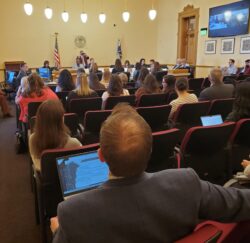Hello, Mary. Hello, Jane.
Like many Colorado moms, I’ve had to prepare for how to talk with my tween/teen about cannabis in light of a new law that allows adults to use marijuana recreationally. The libertarian in me is pleased that we have become more consistent in how we handle pot vs alcohol and tobacco, but the mom in me has had to figure out a few things.
After all, when we frequently drive by places with names like “Kush Club” and “Giving Tree,” the kids ask questions. And I’m grateful that they ask them of me rather than seeking answers elsewhere.
I want to keep it that way.

Turning Over an Old Leaf
Fortunately, when you’ve had to answer other questions such as adoption-oriented*:
- Mom, am I a bastard?
- Why did my birth mom give me away?
Or the sex-oriented*:
- Mom, does sex feel good?
- Mommy, how do gay people have sex?
Or the death-oriented*:
- What happened to Grandma Lisa after she died?
- Mom, will you promise me you’ll never die?
…you have some simple rules to rely on.
Inhale…
Here are a few tips I’ve learned from addressing tricky conversations previously.
1. Have a series of little talks rather than The Big Talk. Holly van Gulden and Lisa M. Bartels-Rabb talk about “dropping pebbles,” throwing out possible conversation starters and see if your kids are ready to pick up any. This is a way of spreading out the emotional charge for your kids — and maybe for you.
With a story about marijuana on the news just about every day, there are lots of opportunities to seize on one and see if your tween joins you. A dropped pebble might sound like, People are putting marijuana in food? Look what they’re saying on this news story. Or, for the older child How many words do you know for marijuana?
Timing is tricky. You want to be the one to introduce the topic rather than having someone else beat you to it, and you also want to catch your kids while they’re still receptive to such talk coming from you. You don’t want to start too early with your child (say, under 10 or 11), but starting these talks too late can be risky (say, after 14 or 15).
Note: you know your situation best, so take all your factors into your own timing decisions.
2. Assess what is being asked and what is needed. Is your child seeking facts? Does he need assurance or direction? Is this a chance to offer asked-for guidance — the best kind? Tune in, ask questions to gain clarity, and deliver what your child needs. Keep an open stance, emotionally speaking, to let your tween know s/he can always ask you questions.
3. Decharge the topic for yourself. Deal with your own issues with the topic prior to having conversations with your child. Any emotional charge you bring to the table will affect the clarity of your message for your tween. You want to be as matter-of-fact about the subject as you can — aiming for unflusterable — which may mean you first need to do an internal assessment about your own views on marijuana usage. Parents can no longer rely on it’s illegal as a reason to not to use/abuse this drug when the child becomes an adult. Instead, parents must find ways to make their children — who will one day be grown — want to make reasoned and conscious choices now and later.
If you’ve never tried pot, tell your son why you made that decision and what the implications have been. If you have used it and you’re nervous about revealing so, figure out how to defuse that within yourself so you can be up front, appropriately, with your daughter.
If asked directly if you’ve ever used marijuana, it’s highly important not to lie. Never lie to your child. You can deflect (or try to): Time to get ready for basketball practice. You can privatize: That’s private for now. You can temper: Yes, I experimented, or There was a time in my life when I did. You can buy time: Yes, and I’d like to tell you about that sometime. This gives you a chance to figure out how to best handle (and perhaps ask your own counsel of wise people in the mean time*).
But never never never lie to your child. Your kid’s trust in you is too important to risk losing.
4. Use “What’s In It For Me” reasons (and me = your child). You could preach on morality terms (good people don’t do drugs). You could strike fear over eventually becoming that person who runs out of veins to shoot heroin into and has no teeth (the gateway aspect).
But more powerful are the more practical and imminent aspects — why should your child choose not to use pot? Remind your teen:
- Marijuana use is illegal for minors. If you choose to use, the consequences to you (your teen) could be dramatic — legally, financially, reputation-wise, and time-wise.
- Marijuana use has physical implications. Research with your teen just what happens to the lungs, the brain, the circulatory, nervous and respiratory systems, the reflexes, and the energy level, when one uses marijuana. Stick with facts and fight the urge to opine so that you keep your own emotional charge from coming into your conversation. You want your child to make this decision for him/her, rather than for you because the former can be a more enduring and sustainable stance.
- Marijuana use could have other consequences regarding athletics, academics and work performance. It can add difficulty to your life while taking away the ability to care about and rectify it. Make this a two-way dialog in which your tween imagines ways that pot use can affect one’s life.
- When judgment is impaired, there can be life-changing consequences regarding situations like driving a car, having sex, and getting involved peripherally with other people while they have impaired judgment. Talk with your teen about how it would be to face such a situation (a car accident, having sex not-so-intentionally or even being raped, being caught driving while impaired) and how choosing not to use pot helps avoid these potentially devastating scenes.
The ever green message
The message I will continue imparting to my kids is that I want them to live mindfully and intentionally. Like water dripping steadily on rock, I aim to etch into their psyches these sentiments:
“If you’re getting stoned (or drunk) to escape your problems or numb your feelings, that isn’t the same as actually dealing with your problems and feelings. In fact, that adds a layer of problems for you to also feel bad about later. So let’s just deal as things come up. And not let things happen to you accidentally because you’ve abdicated your role as chief in your own life.
“And as for peer pressure, this is why it’s so important to be able to find your core, your center, your inner voice that can tell you if something is a good idea or not — for YOU, not for your acquaintances and friends, who tend to come and go throughout your life. YOU will be with you forever. Tune into YOU. Think about consequences to YOU.”
By now you’re probably realizing these tips are less about pot (or adoption or sex or death) and more about connecting with your growing-up child. And when it’s high time for you to have such talks with your growing-up child, now you have some tools to use.
What are you plans for the Pot Talks?
More resources:
- Part 2 of this post: drinking wine vs smoking pot in front of the kids.
- ColoradoMoms has advice as well as links regarding the edibles aspect.
- Today Moms “The New Drug Talk.”
- Communicating Risks from the National Institutes of Health
- If you are a cannabis consumer, see Cannabis Consumer Campaign.
* Joint effort: In many cases I’ve had help from wise people on the Internet and in real life. Thanks (you know who you are).
Image generated at Weedmaps, used with permission.








24 Responses
Great advice Lori! We also share stories with our kids about friends of ours who were daily pot smokers and how it negatively affected their lives. We also share our opinions about medical uses vs. recreational use, and how 1 bad choice can change the course of your life.
Wise words, my friend! I like your advice on how to neutralize the subject first and just present facts. Reagan surprised me just yesterday with a declaration that she might want to try smoking. I wish I had taken a few deep breaths first so my response wouldn’t have been so emotional! Going to practice that from now on.
This is brilliant, and the advice is applicable to any difficult topic.
I’m bookmarking this post, as it’s a great guide for talking with kids about any subject. Thanks for the invaluable advice.
And coming from another state where marijuana is legalized, I can only imagine the questions you’re getting about a lot of the dispenseries (hell, I have questions!!!). Wishing you lots of luck with your discussions on the topic.
Great advice. Marijuana is not yet legal in my state, N.J., but the conversation to have with your child about any kinds of mood-altering drug, be it alcohol, marijuana, cocaine, prescription drugs., etc…all apply to your article. I always stressed the physical and possible life-changing consequences that may result from it’s use with my own children, especially alcohol, the one drug that is so socially accepted but has the most negative effects.
Why is my “to prove you’re a person” word MIDLIFE????
Excellent advice. I love your take on things – it’s hard to know whether you’re hitting the right note on these kinds of discussions. I feel a little validated that some of my responses have not been cop-outs, but reasonable deferrals of topics that I don’t think we’re all ready to discuss!
This time, my word is connect. Better.
Also, nice puns in your titles there…
I could see your insightful advice could apply to discussions about adoption with your children as well. My three now adult daughters all said what helped for them is not to make myself the perfect “saintly” mom. To share openly that I had made choices that could have had much worse consequences. Yes, I got carried home drunk from a fraternity party back in college. Some mysterious stranger told my roommates that he was very concerned about my welfare. That the fraternity guys just kept giving me more Tequilla Sunrises to see how drunk they could get me because I was their “pick’ for the night.” Your children are lucky to have you as their mom.
Because I have 3 recovered alcoholics in my family, I talk to my teens about the problems with alcohol all of the time. But I realize that I don’t talk about marijuana. Thanks for the tips.
Great suggestions and a reminder I need to throw those teasers out there more often to see how much they are ready and want to talk about…
Thanks for bringing your common-sense approach to parenting to this difficult question. It’s about time someone gave parents real tools they can use. And all with a dose of humor!
Thanks for this post- it is very well-written, and articulate. I am dreading the sex talk much less this which is now so present in Colorado. Thanks for sharing.
Lori,
This is excellent advice, which I need to bookmark for the future. I especially like the part about researching the effects with your teen.
Thanks for helping us parents know what to do; especially since you are right there in the center of it all.
Estelle
So much great advice here. Parenting only gets more challenging as the kids get older and the stakes get higher.
Good advice, Lori. Lots of small talks rather than one big one 🙂
Great post! I’m flagging it for later too. I’m very anti-drug, myself. We’ll have to see how that plays out with marijuana being legalized in more places. It’s only legal for medical use in CA, for now…
I plan to treat it exactly the same as alcohol. I tell my kids they can’t do things that will affect the development of their brains until their brains are all grown up–which is actually older than the legal age for this stuff.
Of course “can’t” won’t work when they are old enough to be around these substances unsupervised by me, so mainly I plan to arm them with knowledge of how such things affect them and why it’s a good idea to keep use of them at a minimum until they’re in their mid twenties.
But I see no difference between pot and alcohol when it comes to my kids health and well being (in fact, I lean towards preferring pot), so it’s not a special challenge beyond the alcohol issue.
My approach was somewhat unorthodox, but it worked for our family. I have a post scheduled for Monday on this topic!
I agree with your What’s in it for me list — that’s the route I would go. In Europe, the attitude toward adolescents drinking is much more relaxed, where parents would rather see their kid try some beer (no driving involved), than overdo it in a bad situation. So, not to be too flippant (as if!), but this reminds me of some advice I received from a mentor at the first publishing house internship I had (I was 17): “Only smoke your parents’ pot.”
I appreciate your thoughtful approach to this tough subject.
Excellent advice!
Way before marijuana was legal here, we’ve been considering how/when to have this conversation with our children as every neighbor we’ve had smokes it regularly. I love the idea the series of little talks. That’s about what my child will be able to handle (I hope). AND it’s about what I’ll be able to handle (I hope).
Great advice and resources. We are fairly open with our children and they also come to us with their questions. Since our state is not legal yet and assuming they might be at some point, I appreciate your thoughts on this.